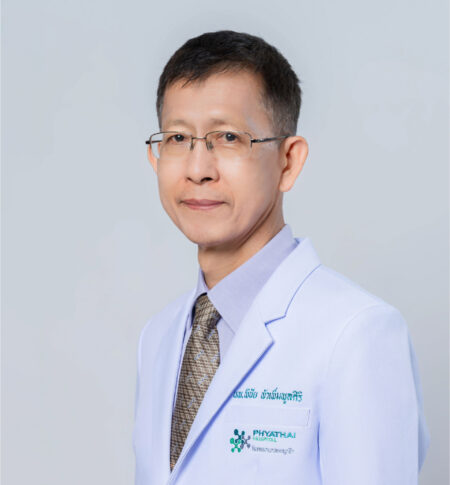
Dr. Wilawan Suriyayon
The area around the ears, throat, and nose is referred to as the ENT (Ear, Nose, and Throat) region, or the hidden recess. When there are certain symptoms in this area, many people might consider them minor issues. However, there could be serious underlying diseases. For instance, if we experience a persistent earache or loud noises in the ear, it could be an early sign of nasopharyngeal carcinoma (cancer behind the nose) or sudden sensorineural hearing loss. If not promptly treated within two to three days, this could lead to permanent nerve damage.
“In treating allergy and sinus conditions, we employ a holistic approach that includes medication, surgery, and vaccination. Based on our experience and continuous learning, we have expanded the treatment options from solely relying on medication to include surgical interventions. This comprehensive approach allows us to provide more effective and well-rounded care for each patient.”
Surgical Endoscopy Using Radio Frequency
In the field of surgery, Dr. Wilawan currently employs the technique of surgical endoscopy using Radio Frequency to treat nasal allergies. This procedure involves endoscopic sinus surgery combined with the use of a microdebrider to treat chronic sinusitis, nasal polyps, and inflamed tissues in the nasal and sinus cavities. The advantage of this method is that patients do not need to stay in the hospital.
“People with allergies often experience sneezing and a runny nose. In about 90% of cases, hospitals usually prescribe medications along with lifestyle adjustments and environmental changes to alleviate the symptoms. For the majority of patients, these measures result in significant improvement. However, about 10% of patients may not experience relief despite medication and lifestyle adjustments. In such cases, the doctor may consider surgical intervention using endoscopy with Radio Frequency. This approach yields almost 100% improvement, effectively restoring the patient’s quality of life.”
Comprehensive Treatment and Preventive Measures
Dr. Wilawan’s group of patients, suffering from allergies, often includes family members, as some causes can be genetic, and they may share similar environmental factors. Once the doctor identifies the patient’s environmental triggers and disease-related factors, apart from providing various treatment options, the doctor also advises patients on avoiding or managing these triggers. This advice is often shared by word of mouth when one patient sees improvement or recovery. The doctor’s guidance is crucial.
“For individuals who experience mild symptoms such as occasional sneezing and a slightly runny nose triggered by dust or other factors, and these symptoms improve with allergy medication, they fall into the category of those with minimal symptoms who may not seek medical attention. However, if someone experiences progressively severe symptoms that disrupt daily life, such as persistent sneezing, excessive runny nose, nasal congestion, disturbed sleep, reduced work efficiency, or even loss of smell, they should consult a doctor for treatment and better management of the condition, leading to an improved quality of life.”




